Unit 1 Where did you go on vacation Section A Grammar Focus_3c课件(共28张PPT)2024-2025学年人教版八年级英语上册
文档属性
| 名称 | Unit 1 Where did you go on vacation Section A Grammar Focus_3c课件(共28张PPT)2024-2025学年人教版八年级英语上册 |  | |
| 格式 | pptx | ||
| 文件大小 | 1.7MB | ||
| 资源类型 | 教案 | ||
| 版本资源 | 人教新目标(Go for it)版 | ||
| 科目 | 英语 | ||
| 更新时间 | 2024-09-03 08:11:21 | ||
图片预览

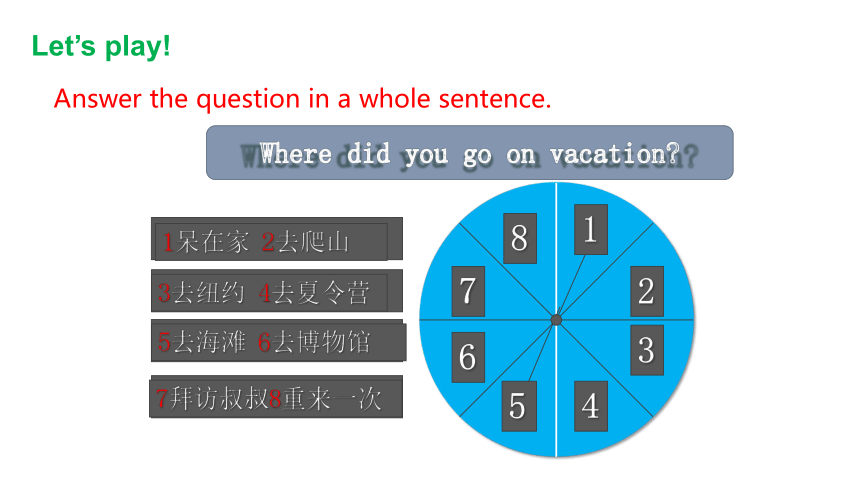
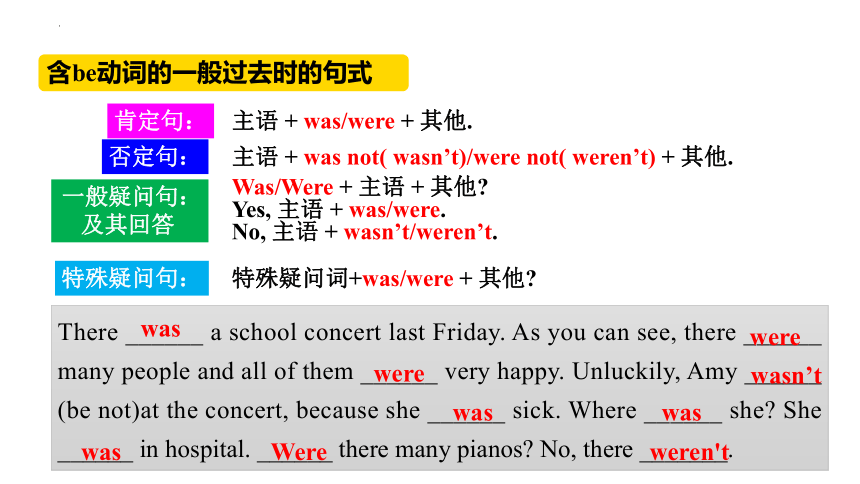
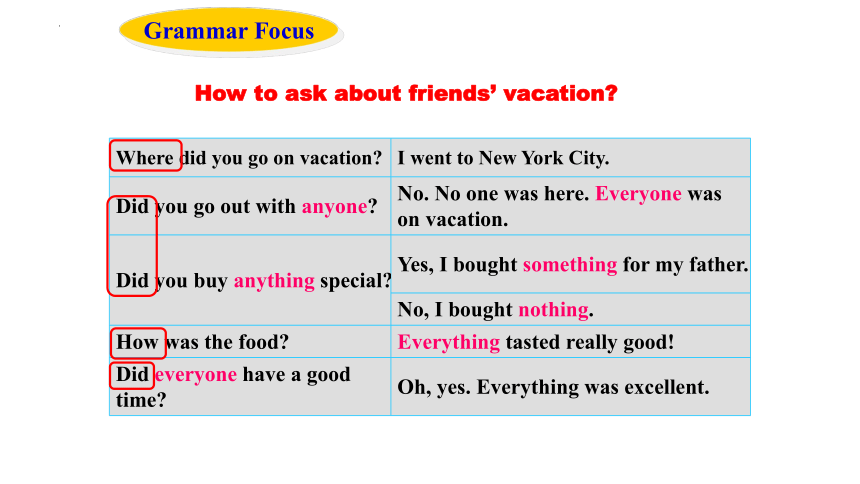
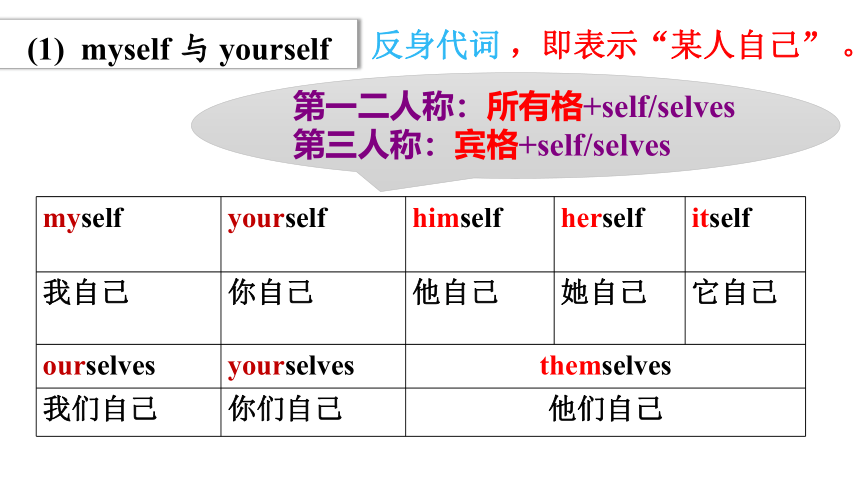
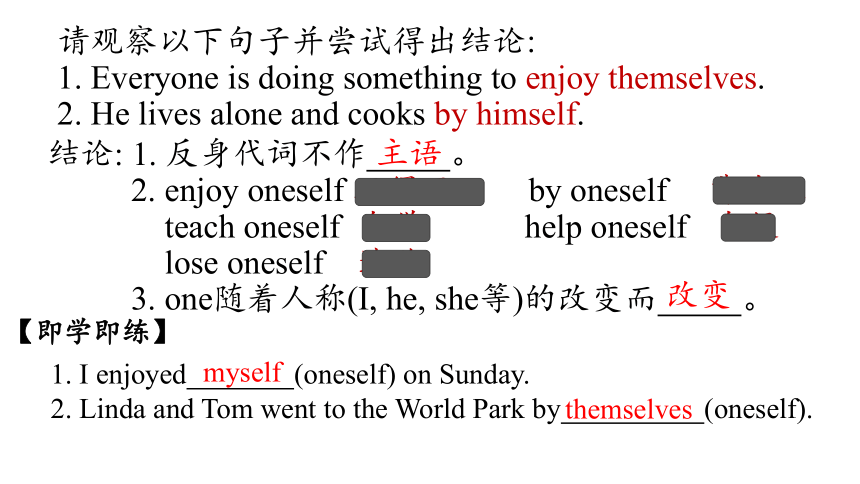
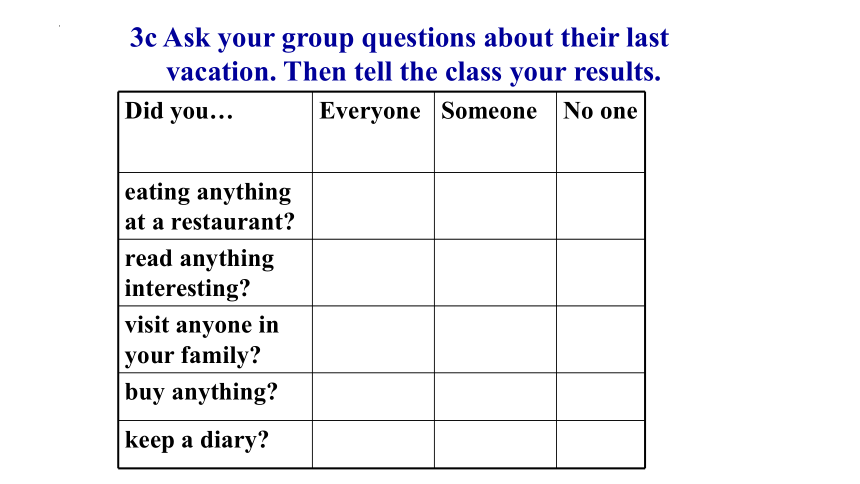
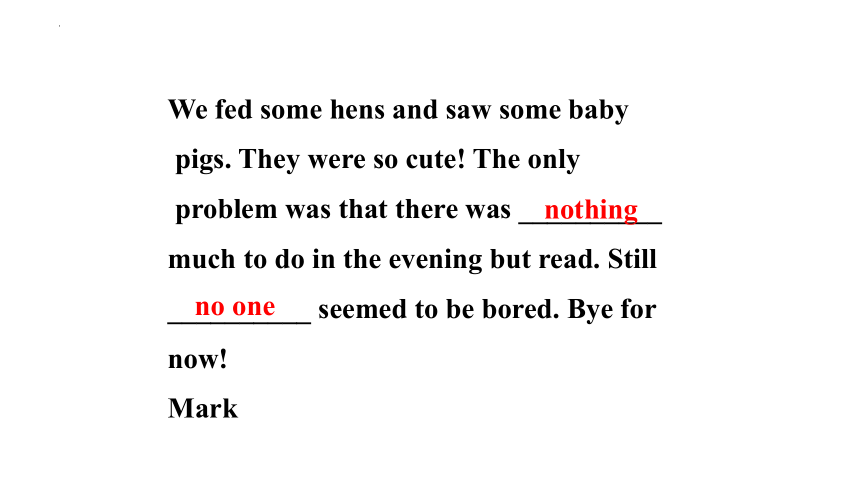
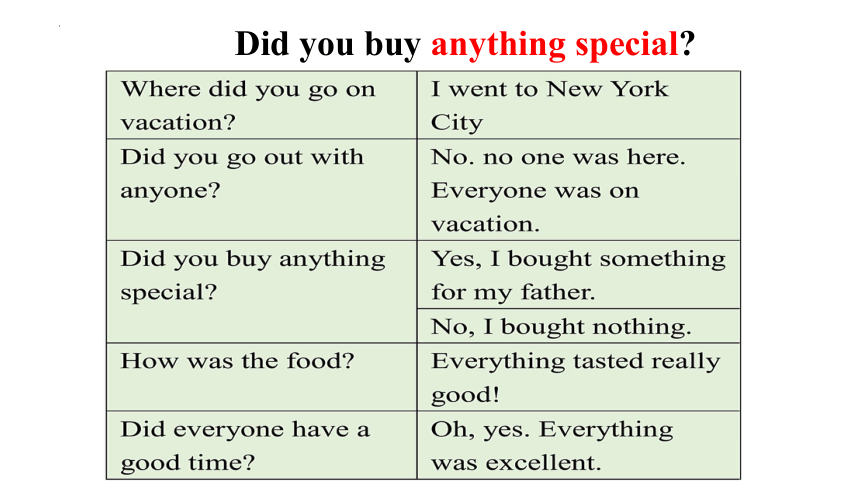
文档简介
(共28张PPT)
人教新目标Go For It八年级英语上册
Unit1 Where did you go on vacation SectionA Grammar Focus-3c
Where did you go on vacation
1
2
3
4
5
6
7
8
1呆在家 2去爬山
3去纽约 4去夏令营
5去海滩 6去博物馆
7拜访叔叔8重来一次
Answer the question in a whole sentence.
Let’s play!
含be动词的一般过去时的句式
肯定句:
否定句:
一般疑问句:
及其回答
特殊疑问句:
主语 + was/were + 其他.
主语 + was not( wasn’t)/were not( weren’t) + 其他.
Was/Were + 主语 + 其他
Yes, 主语 + was/were.
No, 主语 + wasn’t/weren’t.
特殊疑问词+was/were + 其他
There ______ a school concert last Friday. As you can see, there ______ many people and all of them ______ very happy. Unluckily, Amy ______ (be not)at the concert, because she ______ sick. Where ______ she She ______ in hospital. ______ there many pianos No, there _______.
was
were
were
wasn’t
was
was
was
Were
weren't
Where did you go on vacation I went to New York City.
Did you go out with anyone No. No one was here. Everyone was on vacation.
Did you buy anything special Yes, I bought something for my father.
No, I bought nothing.
How was the food Everything tasted really good!
Did everyone have a good time Oh, yes. Everything was excellent.
Grammar Focus
How to ask about friends’ vacation
(1) myself 与 yourself
反身代词 ,即表示“某人自己” 。
myself yourself himself herself itself
我自己 你自己 他自己 她自己 它自己
ourselves yourselves themselves 我们自己 你们自己 他们自己 第一二人称:所有格+self/selves
第三人称:宾格+self/selves
请观察以下句子并尝试得出结论:
1. Everyone is doing something to enjoy themselves.
2. He lives alone and cooks by himself.
结论: 1. 反身代词不作 。
2. enjoy oneself 玩得开心 by oneself 靠自己
teach oneself 自学 help oneself 自便
lose oneself 迷路
3. one随着人称(I, he, she等)的改变而 。
主语
改变
【即学即练】
1. I enjoyed (oneself) on Sunday.
2. Linda and Tom went to the World Park by (oneself).
myself
themselves
3c Ask your group questions about their last
vacation. Then tell the class your results.
Did you… Everyone Someone No one
eating anything at a restaurant
read anything interesting
visit anyone in your family
buy anything
keep a diary
We fed some hens and saw some baby
pigs. They were so cute! The only
problem was that there was __________ much to do in the evening but read. Still __________ seemed to be bored. Bye for now!
Mark
nothing
no one
Did you buy anything special
Where did you go on vacation I went to New York City.
Did you go out with anyone No. No one was here. Everyone was on vacation.
Did you buy anything special Yes, I bought something for my father.
No, I bought nothing.
How was the food Everything tasted really good!
Did everyone have a good time Oh, yes. Everything was excellent.
Did you buy anything special
含do的一般过去时的句式
肯定句:
否定句:
一般疑问句:
及其回答
特殊疑问句:
主语 + 动词过去式 + 其他.
主语 + did not(didn’t) + 动词原形 + 其他.
Did +主语 + 动词原形 + 其他
Yes, 主语 + did.
No, 主语 + didn’t.
特殊疑问词 + did + 主语 + 动词原形 +其他.
Mike’s school trip ______ great. Where ______ she go She _______ (not go) to the zoo. She ______ (go) to a farm. On the farm, Carol ______ (milk) a cow and ______ (ride) a horse. ______ she feed chickens No, she ______. She only ______ (see) them.
In the afternoon, she ______ (take) some pictures of flowers. Then, she ______ (go) for a walk with her friends and ______ (talk) with a farmer.
was
did
didn’t go
went
milked
rode
didn’t
saw
took
went
talked
Did
Points
anyone
anything
nothing
everyone
everything
something
复合不定代词
-thing(事) -one(人) -body(人) -where(地方)
any-(任何)
some- (一些/某些)
every-(每一)
no-(没有)
anything
something
everything
nothing
anyone
someone
everyone
no one
anybody
somebody
everybody
nobody
anywhere
somewhere
everywhere
nowhere
请结合课本思考以下问题并完成下列表格:
1. any, some, every和no分别是什么意思
2. thing, one, body和where分别是什么意思
3. 分别两两组合后的单词是什么意思
-thing -one -body -where
any-
some-
every-
no-
somebody 某人 anybody 任何人 nobody 没有人 everybody
每人
someone 某人 anyone 任何人 no one 没有人 everyone
每人
something 某物 anything 任何事 nothing 没有东西 everything
每一件事
1.定义:由some, any, no, every分别加上-one, -body, -thing构成的不定代词叫做合成不定代词或复合不定代词。
复合不定代词
Grammar Focus
复合不定代词的用法
1.some-类和any-类复合不定代词的用法区别
some-类复合不定代词 any-类复合不定代词
肯定句 常用于肯定句 若any-类复合不定代词用于肯定句时,表示“随便哪个”
疑问句 在表示请求并希望得到对方肯定回答的疑问句中,要用some-类复合不定代词 常用于疑问句中
否定句 常用于否定句中
例句 ①我的自行车出毛病了。 There is ___________ wrong with my bike. ②你想要一些喝的东西吗? Would you like __________ to drink ①在教室里我没看见任何人。
I can’t see _______in the classroom.
②我认为任何人都会做。
I think________ can do it.
something
anyone
something
anyone
复合不定代词
some(某些/个)
any(任何)
every (每一)
no(没有)
thing(事/物)
one (人)
body (人)
where (地点)
+
something
someone
somebody
somewhere
anything
anyone
anybody
anywhere
nothing
no one
nobody
nowhere
everything
everyone
everybody
everywhere
somebody anybody nobody everybody
someone anyone no one everyone
something anything nothing everything
Indefinite pronouns 不定代词
Xiao Ming, he has something important to tell you.
不定代词必须放在adj.和else前
Can you find anyone else
Everything is possible!
不定代词 + adj. / else
something, someone等:肯定句
anything, anyone等:否定句、疑问句
不定代词做主语,谓语动词用单三形式
Points
Once upon a time, there was a time.
A temple was in the mountain.
A little monk lived in the temple.
He happily went down the mountain to carry water.
One day, a thin monk came to the temple.
Then, these two monks carried water together.
Finally, all of them didn’t carry water any more.
Suddenly, the temple was on fire.
一般过去时
总结:1. 一般过去时的特殊疑问句结构:
W-H(特殊疑问代词)+ did +主语+动词原形+其他?
2. 一般过去时的一般疑问句结构:
Did +主语+动词原形+其他?
W-H(特殊疑问代词)+ was/were +主语+其他?
Was/Were+主语+其他?
1.nothing but to do sth. 某人除了某事之外什么也没...。
此处的but表示“除了”,前有实义动词do时but后的不定式需省略to
Eg: I do nothing but play with the phone.
Eg: My teacher tells me nothing but to come on.
2.seem 用法:
(1) 主语+seem+形容词 .Eg: She seemed sad.
(2) seem to do sth Eg: She seemed to be sad.
(3) It seems that+从句 Eg: It seemed that she was sad.
3.-ed 结尾的形容词常修饰____;
-ing 结尾的形容词常修饰____;
bored “感到无聊的;厌烦的” ,常用于修饰人;
boring “无聊的,令人厌烦的”,常用于修饰物。
物
一般过去时
定义:①表示______某个时间里发生的动作或状态;
②表示_____习惯性、经常性的动作或行为。
过去
过去
常用时间标志词: yesterday; just now; in 1997; last month;
2 years ago;...
常用不规则动词: am/is-was are-were get-got see-saw say-said speak-spoke
give-gave have-had go-went eat-ate come-came drink-drank
take-took ride-rode fly-flew sit-sat make-made write-wrote
put-put read-read run-ran do-did draw-drew sweep-swept
不定代词中考考点3
复合不定代词作主语,谓语动词用单数
1.Something ____ wrong with my watch.(be)
2.Well, everyone _______ to win. (want)
3. Nobody __________ what the weather will be like.(know)
4.There_________ something wrong with my bike.(be)
is
is
wants
knows
不定代词中考考点4
形容词修饰复合不定代词,要置于其后。
I meet someone interesting.
Did you meet anyone interesting
I want something special.
Did you eat anything delicious
We ______ (live) in Japan last year.
Jack ________ (stop) the car last Sunday.
Tom _______ (clean) my room and ______(study).
for the Chinese test last weekend.
4.What ______ you ______(do) last night
5.On Sunday morning I _____ (play) tennis.
lived
stopped
cleaned
studied
did
do
played
用所给动词的适当形式填空。
据汉语意思完成英语句子。
1) 这儿的衣服似乎很贵。
The clothes here ___________ very expensive.
2) 他们似乎周六要去上海。
They seem _______ to Shanghai on Saturday.
3) 好像今天她要开车去上班。
_____________ she’ll drive to work today.
seem to be
to go
It seems that
人教新目标Go For It八年级英语上册
Unit1 Where did you go on vacation SectionA Grammar Focus-3c
Where did you go on vacation
1
2
3
4
5
6
7
8
1呆在家 2去爬山
3去纽约 4去夏令营
5去海滩 6去博物馆
7拜访叔叔8重来一次
Answer the question in a whole sentence.
Let’s play!
含be动词的一般过去时的句式
肯定句:
否定句:
一般疑问句:
及其回答
特殊疑问句:
主语 + was/were + 其他.
主语 + was not( wasn’t)/were not( weren’t) + 其他.
Was/Were + 主语 + 其他
Yes, 主语 + was/were.
No, 主语 + wasn’t/weren’t.
特殊疑问词+was/were + 其他
There ______ a school concert last Friday. As you can see, there ______ many people and all of them ______ very happy. Unluckily, Amy ______ (be not)at the concert, because she ______ sick. Where ______ she She ______ in hospital. ______ there many pianos No, there _______.
was
were
were
wasn’t
was
was
was
Were
weren't
Where did you go on vacation I went to New York City.
Did you go out with anyone No. No one was here. Everyone was on vacation.
Did you buy anything special Yes, I bought something for my father.
No, I bought nothing.
How was the food Everything tasted really good!
Did everyone have a good time Oh, yes. Everything was excellent.
Grammar Focus
How to ask about friends’ vacation
(1) myself 与 yourself
反身代词 ,即表示“某人自己” 。
myself yourself himself herself itself
我自己 你自己 他自己 她自己 它自己
ourselves yourselves themselves 我们自己 你们自己 他们自己 第一二人称:所有格+self/selves
第三人称:宾格+self/selves
请观察以下句子并尝试得出结论:
1. Everyone is doing something to enjoy themselves.
2. He lives alone and cooks by himself.
结论: 1. 反身代词不作 。
2. enjoy oneself 玩得开心 by oneself 靠自己
teach oneself 自学 help oneself 自便
lose oneself 迷路
3. one随着人称(I, he, she等)的改变而 。
主语
改变
【即学即练】
1. I enjoyed (oneself) on Sunday.
2. Linda and Tom went to the World Park by (oneself).
myself
themselves
3c Ask your group questions about their last
vacation. Then tell the class your results.
Did you… Everyone Someone No one
eating anything at a restaurant
read anything interesting
visit anyone in your family
buy anything
keep a diary
We fed some hens and saw some baby
pigs. They were so cute! The only
problem was that there was __________ much to do in the evening but read. Still __________ seemed to be bored. Bye for now!
Mark
nothing
no one
Did you buy anything special
Where did you go on vacation I went to New York City.
Did you go out with anyone No. No one was here. Everyone was on vacation.
Did you buy anything special Yes, I bought something for my father.
No, I bought nothing.
How was the food Everything tasted really good!
Did everyone have a good time Oh, yes. Everything was excellent.
Did you buy anything special
含do的一般过去时的句式
肯定句:
否定句:
一般疑问句:
及其回答
特殊疑问句:
主语 + 动词过去式 + 其他.
主语 + did not(didn’t) + 动词原形 + 其他.
Did +主语 + 动词原形 + 其他
Yes, 主语 + did.
No, 主语 + didn’t.
特殊疑问词 + did + 主语 + 动词原形 +其他.
Mike’s school trip ______ great. Where ______ she go She _______ (not go) to the zoo. She ______ (go) to a farm. On the farm, Carol ______ (milk) a cow and ______ (ride) a horse. ______ she feed chickens No, she ______. She only ______ (see) them.
In the afternoon, she ______ (take) some pictures of flowers. Then, she ______ (go) for a walk with her friends and ______ (talk) with a farmer.
was
did
didn’t go
went
milked
rode
didn’t
saw
took
went
talked
Did
Points
anyone
anything
nothing
everyone
everything
something
复合不定代词
-thing(事) -one(人) -body(人) -where(地方)
any-(任何)
some- (一些/某些)
every-(每一)
no-(没有)
anything
something
everything
nothing
anyone
someone
everyone
no one
anybody
somebody
everybody
nobody
anywhere
somewhere
everywhere
nowhere
请结合课本思考以下问题并完成下列表格:
1. any, some, every和no分别是什么意思
2. thing, one, body和where分别是什么意思
3. 分别两两组合后的单词是什么意思
-thing -one -body -where
any-
some-
every-
no-
somebody 某人 anybody 任何人 nobody 没有人 everybody
每人
someone 某人 anyone 任何人 no one 没有人 everyone
每人
something 某物 anything 任何事 nothing 没有东西 everything
每一件事
1.定义:由some, any, no, every分别加上-one, -body, -thing构成的不定代词叫做合成不定代词或复合不定代词。
复合不定代词
Grammar Focus
复合不定代词的用法
1.some-类和any-类复合不定代词的用法区别
some-类复合不定代词 any-类复合不定代词
肯定句 常用于肯定句 若any-类复合不定代词用于肯定句时,表示“随便哪个”
疑问句 在表示请求并希望得到对方肯定回答的疑问句中,要用some-类复合不定代词 常用于疑问句中
否定句 常用于否定句中
例句 ①我的自行车出毛病了。 There is ___________ wrong with my bike. ②你想要一些喝的东西吗? Would you like __________ to drink ①在教室里我没看见任何人。
I can’t see _______in the classroom.
②我认为任何人都会做。
I think________ can do it.
something
anyone
something
anyone
复合不定代词
some(某些/个)
any(任何)
every (每一)
no(没有)
thing(事/物)
one (人)
body (人)
where (地点)
+
something
someone
somebody
somewhere
anything
anyone
anybody
anywhere
nothing
no one
nobody
nowhere
everything
everyone
everybody
everywhere
somebody anybody nobody everybody
someone anyone no one everyone
something anything nothing everything
Indefinite pronouns 不定代词
Xiao Ming, he has something important to tell you.
不定代词必须放在adj.和else前
Can you find anyone else
Everything is possible!
不定代词 + adj. / else
something, someone等:肯定句
anything, anyone等:否定句、疑问句
不定代词做主语,谓语动词用单三形式
Points
Once upon a time, there was a time.
A temple was in the mountain.
A little monk lived in the temple.
He happily went down the mountain to carry water.
One day, a thin monk came to the temple.
Then, these two monks carried water together.
Finally, all of them didn’t carry water any more.
Suddenly, the temple was on fire.
一般过去时
总结:1. 一般过去时的特殊疑问句结构:
W-H(特殊疑问代词)+ did +主语+动词原形+其他?
2. 一般过去时的一般疑问句结构:
Did +主语+动词原形+其他?
W-H(特殊疑问代词)+ was/were +主语+其他?
Was/Were+主语+其他?
1.nothing but to do sth. 某人除了某事之外什么也没...。
此处的but表示“除了”,前有实义动词do时but后的不定式需省略to
Eg: I do nothing but play with the phone.
Eg: My teacher tells me nothing but to come on.
2.seem 用法:
(1) 主语+seem+形容词 .Eg: She seemed sad.
(2) seem to do sth Eg: She seemed to be sad.
(3) It seems that+从句 Eg: It seemed that she was sad.
3.-ed 结尾的形容词常修饰____;
-ing 结尾的形容词常修饰____;
bored “感到无聊的;厌烦的” ,常用于修饰人;
boring “无聊的,令人厌烦的”,常用于修饰物。
物
一般过去时
定义:①表示______某个时间里发生的动作或状态;
②表示_____习惯性、经常性的动作或行为。
过去
过去
常用时间标志词: yesterday; just now; in 1997; last month;
2 years ago;...
常用不规则动词: am/is-was are-were get-got see-saw say-said speak-spoke
give-gave have-had go-went eat-ate come-came drink-drank
take-took ride-rode fly-flew sit-sat make-made write-wrote
put-put read-read run-ran do-did draw-drew sweep-swept
不定代词中考考点3
复合不定代词作主语,谓语动词用单数
1.Something ____ wrong with my watch.(be)
2.Well, everyone _______ to win. (want)
3. Nobody __________ what the weather will be like.(know)
4.There_________ something wrong with my bike.(be)
is
is
wants
knows
不定代词中考考点4
形容词修饰复合不定代词,要置于其后。
I meet someone interesting.
Did you meet anyone interesting
I want something special.
Did you eat anything delicious
We ______ (live) in Japan last year.
Jack ________ (stop) the car last Sunday.
Tom _______ (clean) my room and ______(study).
for the Chinese test last weekend.
4.What ______ you ______(do) last night
5.On Sunday morning I _____ (play) tennis.
lived
stopped
cleaned
studied
did
do
played
用所给动词的适当形式填空。
据汉语意思完成英语句子。
1) 这儿的衣服似乎很贵。
The clothes here ___________ very expensive.
2) 他们似乎周六要去上海。
They seem _______ to Shanghai on Saturday.
3) 好像今天她要开车去上班。
_____________ she’ll drive to work today.
seem to be
to go
It seems that
同课章节目录
- Unit 1 Where did you go on vacation?
- Section A
- Section B
- Unit 2 How often do you exercise?
- Section A
- Section B
- Unit 3 I'm more outgoing than my sister.
- Section A
- Section B
- Unit 4 What's the best movie theater?
- Section A
- Section B
- Unit 5 Do you want to watch a game show?
- Section A
- Section B
- Unit 6 I'm going to study computer science.
- Section A
- Section B
- Unit 7 Will people have robots?
- Section A
- Section B
- Unit 8 How do you make a banana milk shake?
- Section A
- Section B
- Unit 9 Can you come to my party?
- Section A
- Section B
- Unit 10 If you go to the party, you'll have a grea
- Section A
- Section B
